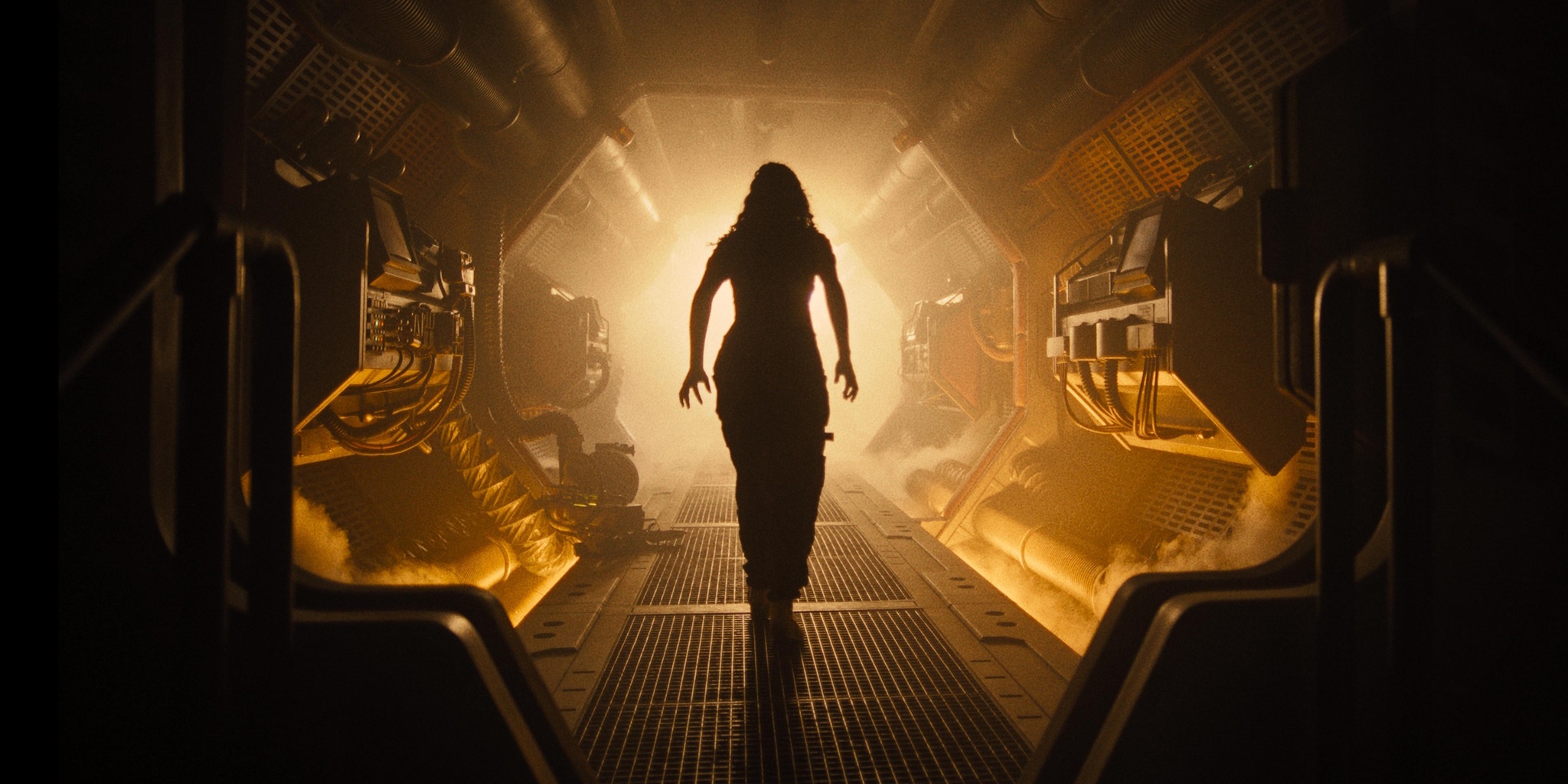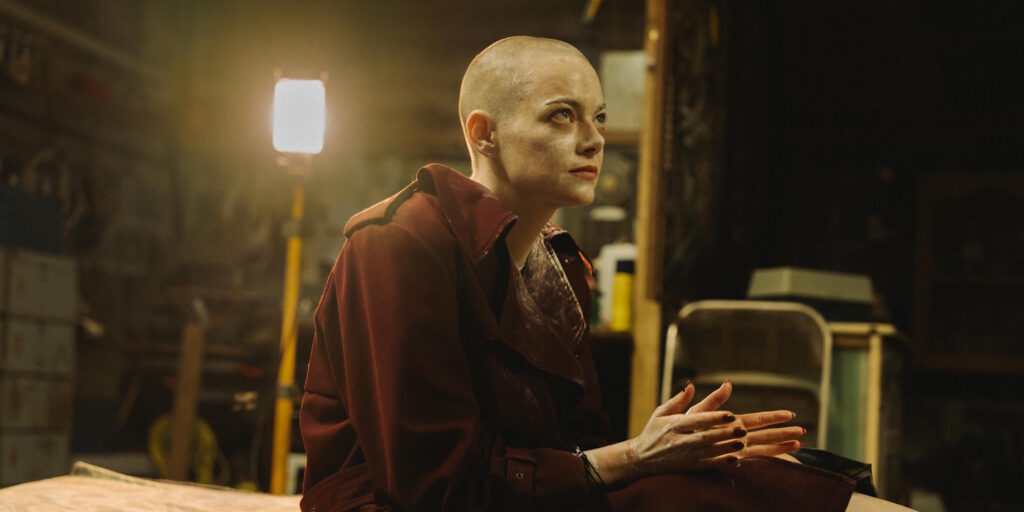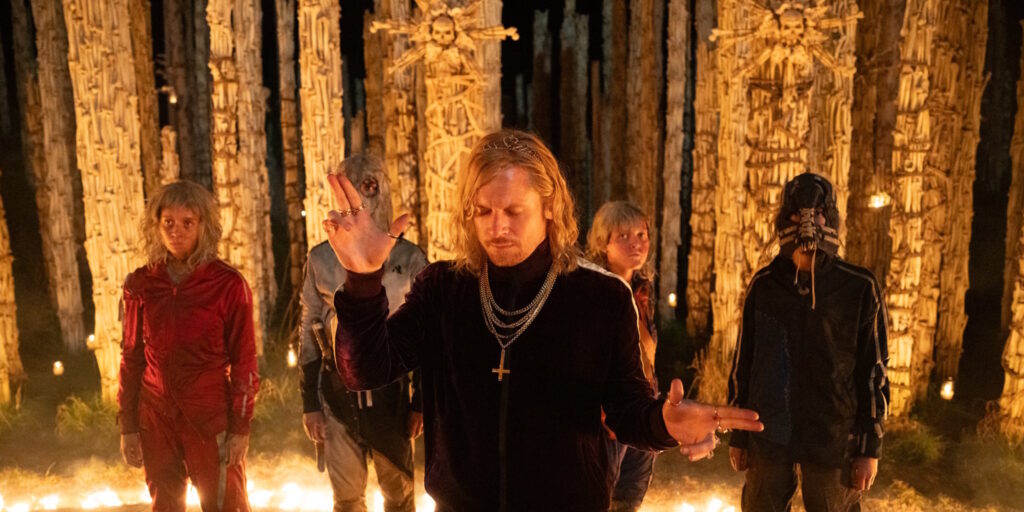The Alien franchise has never really escaped the slime-slicked allure of its core premise: Trap a group of unwitting people in an isolated location and watch in horror as a fantastically lethal and hostile organism hunts them down one by one. Different filmmakers have constructed variously drab and florid shells around that central idea, whether a hoo-rah action blockbuster (and deconstruction of the same) in James Cameron’s Aliens (1986), a dubious AIDS epidemic metaphor in David Fincher’s grimdark nightmare Aliens 3 (1992), or the Chariots of the Gods musings of Ridley’s Scott’s Big Ideas prequel Prometheus (2012). (The less said about those Predator crossover films, the better.) Whatever the approach, filmmakers are eventually drawn to the simple, striking contrast between humanity’s squishy, sluggish vulnerability and the chitinous evolutionary perfection of the Xenomorphs, which act as both parasites and predators. Inevitably, the two species end up in a bulkhead or access tunnel together, to predictably gruesome effect.
Writer-director Fede Álvarez’s latest entry in this storied series, Alien: Romulus – a “midquel” set between Alien (1979) and Aliens, not that the film makes this continuity explicit – does nothing to break with the bloody traditions of its forebears. Indeed, Álvarez (Don’t Breathe, Evil Dead) is reportedly an ardent Alien fanboy, and it should therefore come as no surprise that his foray into the franchise privileges its central monsters-slaughter-humans dynamic. Nor should it shock anyone that Romulus is dense with callbacks to virtually every preceding chapter in the series. A few of these pulls are unexpectedly illuminating, while others are positively groan-worthy, but all evince an enthusiastic Xeno-head who has pored over the series like a proper Fangoria-devouring gorehound.
Accordingly, one might uncharitably describe Álvarez’s feature as a cinematic greatest-hits album, one interested primarily in revisiting situations audiences have seen before in a slightly different key. Yet the filmmaker is far too enamored with the Alien franchise as a whole for accusations of cynical nostalgia-baiting to hold much water. Romulus adores everything about Alien, even its weirdest, goofiest, and most contentious elements, even its most disdained red-headed stepchildren. (This writer, for one, did not expect Álvarez’ s film to allude so overtly to Jean-Pierre Jeunet’s broadly ill-regarded 1997 re-do sequel, Alien: Resurrection.) Most of all, it loves Scott’s original 1979 masterpiece and the grimy pall of dystopian, corpo-futurist doom that has clung stubbornly to the series through decades of artistic ups and downs.
That said, Alien: Romulus smuggles some fascinating contraband inside the familiar, consumer-friendly package of a legacy IP sequel. Replacing the veteran roughnecks, explorers, and colonial marines of its predecessors with a younger cast of ragged, off-world orphans, Álvarez remixes the franchise’s components into a kind of dark fairy tale. Growing up on a sunless mining planet and effectively enslaved for life to the Weyland-Yutani Corporation (the omnipresent “Company”) by predatory contracts, Rain (Cailee Spaeny) and her bottom-scrounging peers dream of escape. It’s easy to see why she might agree to join her ex-situationship Tyler (Archie Reneaux) and his space-rat pals on a risky (and highly illegal) venture to a mothballed orbital outpost, the Renaissance.
The crew’s sketchy plan involves heisting the station’s unused cryogenic sleep pods and escaping to an uncolonized paradise planet several light-years away. In truth, Tyler and company don’t need Rain so much as they need her “brother,” Andy (Rye Lane’s David Jonsson), a glitchy Company android who is all that remains of Rain’s family. He also happens to be a walking, talking digital key that can access the station’s systems. There’s a glimmer of hopefulness to the crew’s endeavor as their rust-bucket space freighter breaches the planet’s ashen clouds and Rain first glimpses the sun she’s never seen. Their very own Neverland seems tantalizingly close, just a quick pit stop and a nine-year stretch in hyper-sleep away.
Unfortunately, the film’s naïve young protagonists are not privy to the events of the feature’s prelude, in which Company scientists recover flash-frozen samples of tissue from the floating debris of the USCSS Nostromo. More to the point, they are not aware that they are in an Alien movie, where there is no possible liberation from the cold-hearted calculus of a Company that always chooses power and profit over people. Here, Alien: Romulus rather remarkably reveals itself as a low-key meta-movie about the devouring black hole of corporate greed, as much The Matrix: Resurrections as it is Star Wars: The Force Awakens. Rain and her allies can no more escape the unintended consequences of Weyland-Yutani’s short-sighted decisions than they can resist the gravitational pull of the franchise that contains them.
Álvarez’s 2013 splatter-horror remake Evil Dead was long on arterial spray but short on both originality and the screwball perversity that made Sam Raimi’s original trilogy so distinctive. Alien: Romulus is similarly dependent on prior franchise entries for its settings and situations (and, in one egregious case, an iconic mic drop), but the director’s grim tonal preferences are a much better fit here. Which isn’t to say that the feature’s rigid IP obligations have blunted Álvarez’s twisted imagination: This is a gross, brutal film that delights in piling one fresh horror after another on the heads of its hapless characters. The third act in particular drags the series kicking and screaming into some sicko Dawn of the Dead-indebted territory that even Scott’s prequel films never quite dared.
Where Álvarez unexpectedly excels is in crafting spectacular, nerve-frying science-fiction disaster set pieces. Indeed, Alien: Romulus ends up being as much a space thriller as a creature-feature horror flick. Smartly employing the Chekhov’s gun rule of sci-fi gobbledygook that Scott and Cameron have perfected – only show a technology if it matters to the plot later – Álvarez and longtime co-writer Rodo Sayagues turn their feature into a pressure cooker of scientific quantities. The characters are pitilessly hemmed in by heat, mass, velocity, and time, with the titular Xenomorph scuttling through the ductwork as the persistent organic wild card. Taking notes from space-based thrillers as diverse as 2010 (1984), Event Horizon (1997), Sunshine (2007), Gravity (2013), and Interstellar (2014), the filmmakers create an escalating orbital catastrophe that almost feels absurd in its abject cruelty.
Spaeny is a fine actor – see her fantastic lead turn in last year’s Priscilla (2023) – but here she’s saddled with a role that’s trying too hard to explicitly evoke Ellen Ripley sans Sigourney’s Weaver inimitable presence. It’s perhaps an unfair equivalence: Spaeny is slight and dewy where Weaver is towering and steely, and Romulus doesn’t really treat their roles as narratively or thematically fungible. (As in Evil Dead, Álvarez is more interested in sibling relationships than those between parent and child.) Still, you can’t put a pulse rifle into the well-toned arms of your female lead actor in an Alien movie without inviting comparison. The rest of the cast (Renaux, Spike Fearn, Aileen Wu, and the normally magnetic Isabela Merced) is unfortunately fairly forgettable, which undercuts the supposedly life-or-death dramatic stakes. The exception is Jonsson, who gets to take his stuttering synthetic sidekick to some surprising, scene-stealing places, preserving a series tradition established by the likes of Ian Holm, Lance Henriksen, and Michael Fassbender.
Otherwise, however, the cast feels like a bland Gen-Z reskin of the more colorful characters that populate even the least-regarded entries in the series. Álvarez and his collaborators never really exploit the full potential of a crew assembled from the orphaned cast-offs of capitalism’s bottomless hunger for expansion, although the premise still provides plenty of intriguing subtext. (In one cunning touch, Tyler’s knowledge of military weaponry comes not from firsthand wartime experience but from video games.) Rain’s compatriots are, on the whole, obnoxious little shits, but in the context of this setting they are effectively innocents, yearning only for a better life free of toxic, backbreaking wage slavery. These are not hubris-swollen mad scientists, bloodthirsty military-industrial cowboys, or starry-eyed explorers with messianic delusions. They certainly don’t do anything to deserve the fate that befalls them. However, the Company’s appetite is as all-encompassing as its negligence is indiscriminate. It has left the galaxy heedlessly strewn with its mistakes, and its mistakes do not distinguish between the just and the wicked.
Alien: Romulus open in theaters everywhere on Friday, Aug. 16.




